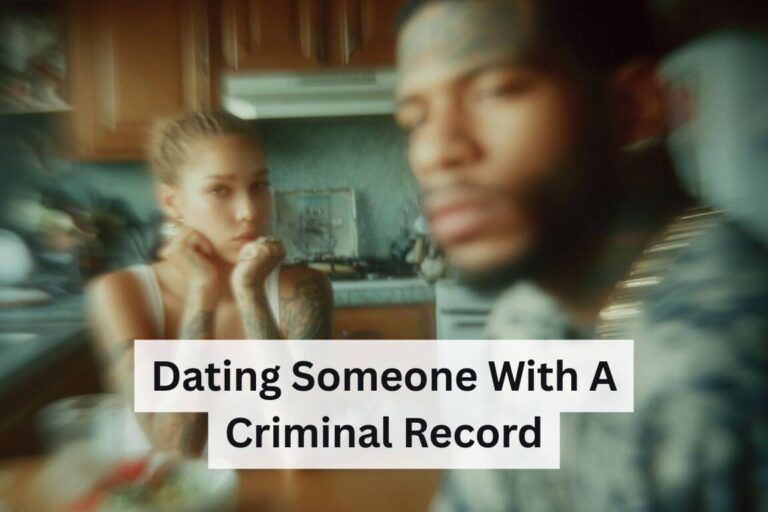When matters of the heart intersect with past mistakes, navigating romance becomes complex territory.
Dating someone with a criminal background presents unique considerations that deserve thoughtful exploration.
Whether you’ve recently discovered your partner’s history or you’re contemplating a relationship with someone who’s been transparent about their past, this comprehensive guide will help you make informed decisions about your romantic future while protecting your emotional well-being.
When Past and Present Collide
The moment you learn about a potential partner’s criminal history can feel overwhelming. Many women describe feeling shocked and devastated when they discover this information, especially if they’ve already developed feelings.
This emotional whiplash is completely normal, and it’s important to give yourself time to process these revelations without making hasty decisions.
The Reality Check involves understanding that criminal records come in many forms. A decades-old non-violent offense carries different implications than recent violent charges.
Context matters enormously when evaluating what this history means for your potential relationship.

Potential Benefits of Second Chance Romance
Despite societal skepticism, relationships with formerly incarcerated individuals can offer unique advantages that shouldn’t be overlooked.
1. Enhanced Appreciation and Gratitude
People who have served time often develop a deeper appreciation for life’s simple pleasures and second chances.
This perspective can translate into a partner who doesn’t take relationships for granted and truly values the opportunity to build something meaningful with you.
2. Increased Resilience and Loyalty
Life behind bars teaches survival skills and mental toughness that can benefit relationships during challenging times.
Having gone through the worst experiences, they understand that tough situations can be opportunities for growth and are more likely to stick with you through thick and thin.
3. Honest Communication Skills
The legal system demands accountability, and many individuals emerge with improved communication abilities.
They’ve often undergone counseling or rehabilitation programs that emphasize honesty, self-reflection, and conflict resolution.
4. Personal Growth and Transformation
Prison experiences frequently catalyze profound personal change. Many individuals use their time for education, skill development, and serious introspection about their life choices.
As one woman discovered, the caring, kind man she knew seemed completely disconnected from the criminal portrayed in news articles.
Significant Challenges to Consider
While second chances deserve consideration, the practical realities of dating someone with a criminal record present substantial obstacles.
1. Employment and Financial Constraints
Job market limitations represent perhaps the biggest challenge. Background checks can lead to immediate rejection from employers, creating salary ceilings and career mobility restrictions.
This employment difficulty creates financial strain on relationships, potentially making you the primary breadwinner by default rather than choice.
2. Housing Complications
Felons often cannot live in public housing, and many landlords refuse to rent to individuals with criminal records.
This limitation can force housing decisions you’re not ready for and may put undue pressure on your living situation.
3. Social Stigma and Judgment
The ripple effect of stigma extends beyond your partner to you. You become “the woman dating a felon,” carrying a label you didn’t earn.
Some friendships may end over your relationship choice, as people make judgments without even meeting your partner.
4. Travel and Legal Restrictions
Depending on parole conditions, your partner may face travel restrictions that limit vacation options and spontaneous trips.
Some countries may deny entry based on criminal history, affecting your future travel plans as a couple.
5. Trust and Recidivism Concerns
Statistics show that individuals with criminal histories have higher chances of repeating offenses than those who have never committed crimes.
This reality requires honest assessment of your comfort level with potential risks.
Red Flags That Demand Attention
While everyone deserves second chances, certain warning signs should trigger serious concern:
1. Pattern Recognition
Multiple convictions or recent charges suggest ongoing issues rather than isolated mistakes. Pay attention to the timeline and frequency of legal troubles.
2. Dishonesty About the Past
Hiding criminal history initially, though understandable, raises questions about transparency in other areas. How and when someone reveals their past tells you about their character and communication style.
3. Lack of Accountability
Someone who blames circumstances, other people, or “being in the wrong place at the wrong time” without accepting personal responsibility may not have fully processed their actions.
4. Substance Abuse Issues
Unaddressed addiction problems that contributed to criminal behavior remain significant risks for future relationships and potential reoffending.

Making Informed Decisions
Research and Background Checks
Public record searches provide factual information about charges, conviction dates, and sentence details. Understanding the specifics helps you make informed rather than emotional decisions.
Professional Consultation
Speaking with probation officers or legal professionals can provide realistic perspectives on rehabilitation prospects and ongoing restrictions.
Family and Support Network Input
While the decision ultimately rests with you, trusted friends and family members may notice red flags you’re missing due to emotional involvement.
Protecting Your Interests
Financial Boundaries
Establish clear financial boundaries early. Avoid co-signing loans, sharing bank accounts, or taking on debt related to legal fees or restitution payments.
Child Custody Considerations
If you have children, understand how your relationship choices might affect custody arrangements. Some courts consider a parent’s romantic partner’s criminal history during custody disputes.
Career Impact Assessment
Consider whether your profession or employer might have policies about employees’ associations with individuals who have criminal records.
Safety Planning
Develop safety protocols if the criminal history involves violence or if you notice concerning behavioral patterns.
Practical Relationship Strategies
Open Communication
Establish honest dialogue about expectations, concerns, and boundaries. Regular check-ins about how you’re both handling societal pressures can strengthen your bond.
Support Network Building
Connect with others who’ve navigated similar relationships. Support groups and online communities provide valuable insights and emotional support.
Future Planning
Discuss long-term goals realistically. Address potential obstacles like employment limitations, travel restrictions, and family planning considerations.
Professional Support
Consider couples counseling to navigate unique challenges and develop healthy communication patterns.
Community and Legal Resources
Reentry Organizations
Many communities offer programs supporting formerly incarcerated individuals with job placement, housing assistance, and counseling services.
Legal Aid Services
Understanding your partner’s ongoing legal obligations and rights protects both of you from unintentional violations.
Financial Counseling
Professional guidance on managing finances when one partner faces employment limitations can prevent relationship stress.
When to Walk Away
Some situations warrant ending the relationship for your safety and well-being:
- Active substance abuse without treatment commitment
- Violent criminal history with concerning current behavior
- Repeated dishonesty about important matters
- Pressure to engage in illegal activities
- Violation of parole terms demonstrating poor judgment
- Your safety feels threatened in any way
Final Considerations
Dating someone with a criminal record requires careful evaluation of multiple factors.
While past mistakes don’t necessarily define someone’s capacity for love and growth, practical challenges demand realistic assessment.
Your happiness and safety must remain the priority. Some relationships with formerly incarcerated individuals flourish into loving, stable partnerships. Others face insurmountable obstacles that no amount of goodwill can overcome.
If someone has truly changed and is committed to building a positive future, they deserve consideration. However, you’re under no obligation to rehabilitate someone or fix their life.
Remember that choosing to date someone with a criminal record is a personal decision that affects your entire life trajectory.
Take time to evaluate whether this person adds value to your life and aligns with your long-term goals.
Sometimes the most loving thing you can do is recognize when a relationship isn’t right for your circumstances, regardless of how much you care about the person.
The path forward requires honest self-reflection about your tolerance for challenges, your support systems, and your non-negotiable standards.
Whatever you decide, ensure it’s based on thoughtful consideration rather than fear, pressure, or wishful thinking about changing someone else.


